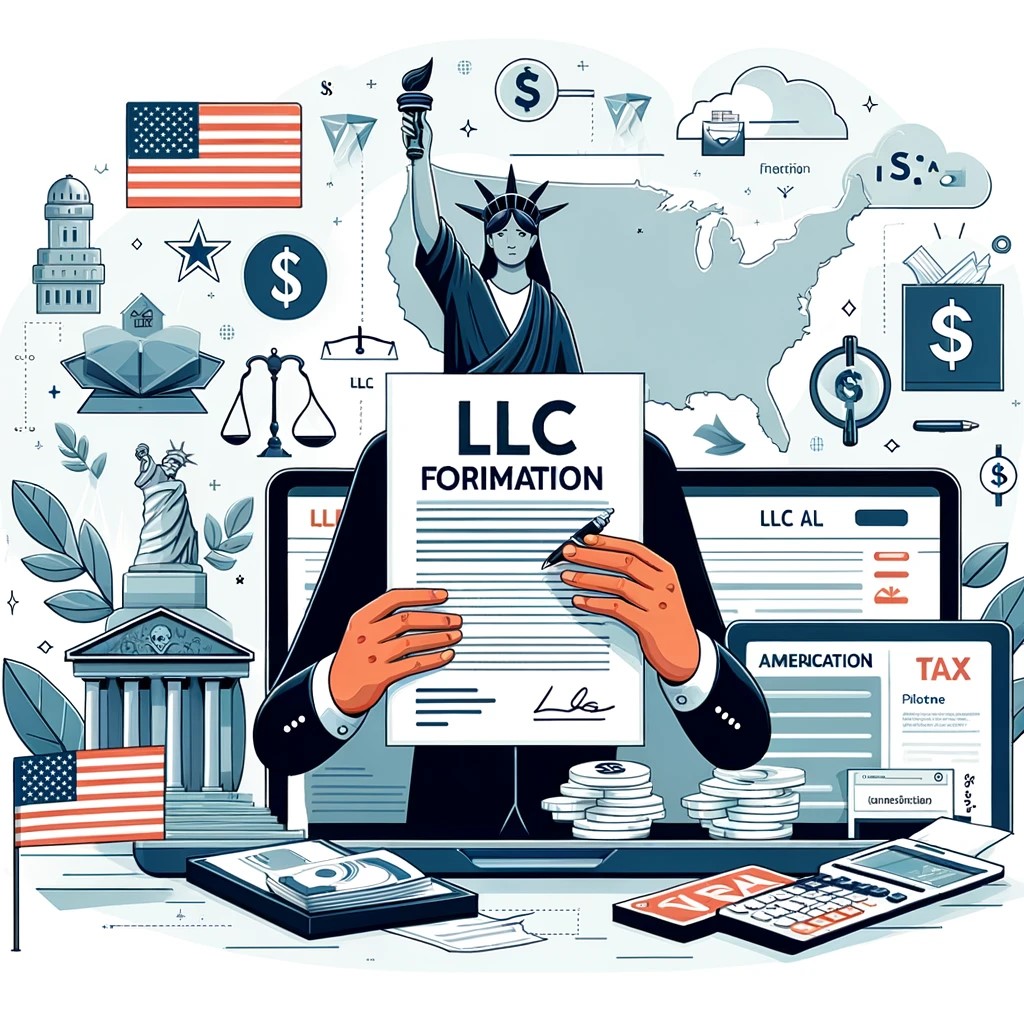

An LLC, or Limited Liability Company, is a popular business structure in the United States, offering limited liability, flexibility, and tax advantages to business owners. This guide provides detailed information on the characteristics, formation steps, and benefits of LLCs. Additionally, we will explore the process of starting an LLC in the USA.
What is an LLC?
An LLC, or Limited Liability Company, is a business structure that offers limited liability protection to its owners. This means that the personal assets of the business owners are protected from the business's debts and liabilities. LLCs provide a flexible management structure and various tax benefits to business owners.
Characteristics of LLCs
An LLC combines the limited liability features of a corporation with the flexibility and tax advantages of a partnership. Here are the main characteristics of LLCs:
- Limited Liability: LLC owners are not personally liable for the company's debts and liabilities.
- Flexible Management: LLCs offer a flexible management structure that can be adapted to the needs of the business.
- Tax Advantages: LLCs can be taxed as a sole proprietorship, partnership, S corporation, or C corporation, providing flexibility in how the business is taxed.
- Ease of Formation: Forming an LLC is generally simpler and involves less paperwork than forming a corporation.
Advantages of Starting an LLC
Starting an LLC comes with several benefits, making it a popular choice for many business owners. The main advantages of an LLC include:
- Personal Asset Protection: Owners' personal assets are protected from business debts and liabilities.
- Flexible Taxation: LLCs can choose how they are taxed, allowing owners to optimize their tax situation.
- Simplified Management: LLCs have a flexible management structure, which can be less rigid than that of a corporation.
- Fewer Formalities: LLCs typically have fewer compliance requirements and formalities compared to corporations.
Steps to Form an LLC
Forming an LLC involves a series of steps that vary by state. Here is a general outline of the process:
- Choose a Name for Your LLC: The name must be unique and comply with state regulations.
- Select a State for Your LLC: Decide in which state you want to form your LLC. Each state has different laws and tax rates.
- File Articles of Organization: Prepare and file the Articles of Organization with the appropriate state agency.
- Obtain an EIN: Apply for an Employer Identification Number (EIN) from the IRS for tax purposes.
- Open a Bank Account: Set up a bank account for your LLC to manage its financial transactions.
Naming Your LLC
When naming your LLC, ensure that the name complies with state laws and is not already in use by another business. The name should also include "Limited Liability Company" or an abbreviation such as "LLC."
Choosing a State
Decide in which state you will form your LLC. Some states, like Delaware and Wyoming, are known for their business-friendly regulations and tax benefits. Each state has its own rules and costs associated with forming and maintaining an LLC.
Filing Articles of Organization
The Articles of Organization is a document that outlines the basic information about your LLC, such as its name, address, and members. This document must be filed with the state agency responsible for business registrations, typically the Secretary of State's office.
Obtaining an EIN
An Employer Identification Number (EIN) is required for your LLC to hire employees, open a bank account, and file taxes. You can apply for an EIN online through the IRS website.
Opening a Bank Account
Having a separate bank account for your LLC helps to keep your business finances organized and separate from your personal finances. Most banks will require your Articles of Organization and EIN to open an account.
Tax Benefits of an LLC
LLCs offer various tax advantages that can benefit business owners. Here are the key tax benefits of an LLC:
- Pass-Through Taxation: LLCs typically enjoy pass-through taxation, meaning the business income is reported on the owners' personal tax returns, avoiding double taxation.
- Flexible Taxation Options: LLCs can choose to be taxed as a sole proprietorship, partnership, S corporation, or C corporation.
- Deductible Expenses: LLCs can deduct legitimate business expenses, which can reduce taxable income.
LLC vs. Corporation
LLCs and corporations differ in several ways, including liability protection, taxation, and management structure. Here are the main differences:
- Liability Protection: Both LLCs and corporations offer limited liability protection, but LLCs are often simpler to manage.
- Taxation: LLCs enjoy pass-through taxation, while corporations face double taxation unless they elect S corporation status.
- Management: LLCs offer flexible management structures, whereas corporations have a more rigid, hierarchical structure.
Disadvantages of an LLC
While LLCs have many advantages, they also have some potential drawbacks:
- Self-Employment Taxes: LLC owners may be subject to self-employment taxes on their share of the profits.
- Annual Fees: Some states require LLCs to pay annual fees or franchise taxes.
- Varying State Laws: LLC laws and regulations can vary significantly from state to state, potentially creating complexity for businesses operating in multiple states.
Cost of Forming an LLC
The cost of forming an LLC can vary depending on the state and the services you use. Common costs include:
- Filing Fees: These vary by state but typically range from $50 to $500.
- Annual Fees: Some states charge annual fees or require LLCs to file annual reports.
- Professional Services: You may incur additional costs if you hire a lawyer or use a formation service to help set up your LLC.
Management Structure of an LLC
LLCs offer flexible management structures that can be tailored to the needs of the business. Common management structures include:
- Member-Managed: All members participate in the management and decision-making of the LLC.
- Manager-Managed: Members appoint one or more managers to handle the day-to-day operations of the LLC.
Required Documents for an LLC
Forming an LLC requires preparing and filing specific documents, including:
- Articles of Organization: This document officially forms the LLC and includes basic information about the company.
- Operating Agreement: While not required in all states, an operating agreement outlines the management structure and operating procedures of the LLC.
- EIN: An Employer Identification Number is necessary for tax purposes and to open a bank account.
Tax Obligations of an LLC
LLCs have various tax obligations that must be met, including:
- Income Tax: LLC owners report their share of the profits on their personal tax returns.
- Sales Tax: If the LLC sells taxable goods or services, it must collect and remit sales tax.
- Self-Employment Tax: LLC owners may be subject to self-employment taxes on their share of the profits.
Duration of Forming an LLC
The time it takes to form an LLC can vary by state and the complexity of the business. Typically, the process takes a few weeks from filing the Articles of Organization to receiving your EIN.
Dissolution of an LLC
Dissolving an LLC involves several steps, including:
- Filing Articles of Dissolution: Notify the state agency that the LLC is being dissolved.
- Settling Debts: Pay off any outstanding debts and liabilities.
- Distributing Assets: Distribute any remaining assets to the LLC members.
Frequently Asked Questions about LLCs
What is an LLC? An LLC, or Limited Liability Company, offers limited liability protection and flexible tax options for business owners.
How Do I Form an LLC? Forming an LLC involves choosing a name, selecting a state, filing Articles of Organization, obtaining an EIN, and opening a bank account.
What Are the Advantages of an LLC? LLCs offer personal asset protection, flexible taxation, simplified management, and fewer formalities.
What Are the Disadvantages of an LLC? Potential drawbacks include self-employment taxes, annual fees, and varying state laws.
Contact Tam Accounting to Start Your LLC
Tam Accounting provides professional assistance in forming an LLC in the USA. As an IRS Enrolled Agent and Certified Tax Coach, we support you in all your tax and accounting needs. Contact us now to start the process and successfully establish your LLC in the USA.
This guide has provided detailed information on what an LLC is and how to form one in the USA. With the right strategies and professional assistance, forming an LLC can offer significant opportunities. Tam Accounting is proud to support you throughout this process.






